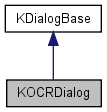kio
KOCRDialog Class Reference
Base class for OCR Dialogs. More...
#include <kscan.h>

Signals | |
| void | textRecognized (const QString &text, int id) |
Public Member Functions | |
| ~KOCRDialog () | |
Static Public Member Functions | |
| static KOCRDialog * | getOCRDialog (QWidget *parent=0L, const char *name=0, bool modal=false) |
Protected Member Functions | |
| int | id () const |
| KOCRDialog (int dialogFace=Tabbed, int buttonMask=Close|Help, QWidget *parent=0L, const char *name=0, bool modal=false) | |
| int | nextId () |
| virtual void | virtual_hook (int id, void *data) |
Detailed Description
Base class for OCR Dialogs.Definition at line 236 of file kscan.h.
Constructor & Destructor Documentation
| KOCRDialog::KOCRDialog | ( | int | dialogFace = Tabbed, |
|
| int | buttonMask = Close|Help, |
|||
| QWidget * | parent = 0L, |
|||
| const char * | name = 0, |
|||
| bool | modal = false | |||
| ) | [protected] |
Constructs the OCR dialog.
If you implement an own dialog, you can customize it with the usual KDialogBase flags.
- Parameters:
-
dialogFace the KDialogBase::DialogType buttonMask a ORed mask of all buttons (see KDialogBase::ButtonCode) parent the QWidget's parent, or 0 name the name of the QObject, can be 0 modal if true the dialog is model
Member Function Documentation
| KOCRDialog * KOCRDialog::getOCRDialog | ( | QWidget * | parent = 0L, |
|
| const char * | name = 0, |
|||
| bool | modal = false | |||
| ) | [static] |
Creates the user's preferred OCR dialog and returns it, or 0L if no OCR-support is available.
Pass a suitable parent widget, if you like. If you don't you have to 'delete' the returned pointer yourself.
- Parameters:
-
parent the QWidget's parent, or 0 name the name of the QObject, can be 0 modal if true the dialog is model
- Returns:
- the KOCRDialog, or 0 if the function failed
| int KOCRDialog::id | ( | ) | const [inline, protected] |
Returns the current id for an image.
You can use that in your subclass for the signals. The id is used in the signals to let people know which text-recognition belongs to which scan.
- Returns:
- the current id for the image
- See also:
- nextId
| int KOCRDialog::nextId | ( | ) | [inline, protected] |
Returns the id for the next image.
You can use that in your subclass for the signals.
- Returns:
- the id for the next image
- See also:
- id
| void KOCRDialog::textRecognized | ( | const QString & | text, | |
| int | id | |||
| ) | [signal] |
Informs you that the image with the id id has been run through text-recognition.
The text is in the QString parameter. In the future, a compound document, using rich text will be used instead.
- Parameters:
-
text the text that has been recognized id the id of the image
| void KOCRDialog::virtual_hook | ( | int | id, | |
| void * | data | |||
| ) | [protected, virtual] |
The documentation for this class was generated from the following files:
 KDE 3.5 API Reference
KDE 3.5 API Reference